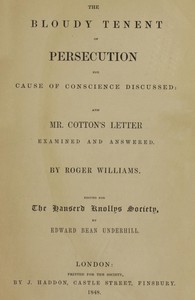| Author |
Williams, Roger, 1604?-1683 |
| Editor |
Underhill, Edward Bean, 1813-1901 |
| Title |
The Bloudy Tenent of Persecution for Cause of Conscience Discussed and Mr. Cotton's Letter Examined and Answered
|
| Credits |
E-text prepared by Brian Wilson, MFR, and the Online Distributed Proofreading Team (https://www.pgdp.net) from page images generously made available by Internet Archive (https://archive.org)
|
| Summary |
"The Bloudy Tenent of Persecution for Cause of Conscience Discussed" by Roger Williams is a theological treatise written in the mid-17th century. The book engages with the pressing issue of religious freedom and the ethics of persecution, arguing against the imposition of religious beliefs on individuals by civil authorities. It is a significant work that reflects Williams' advocacy for the right to worship according to one's conscience, as well as the historical context of religious intolerance during his time. The opening of the work establishes the context of religious persecution in England and America, spotlighting the plight of dissenters like Roger Williams himself. Williams introduces his arguments against the practice of persecution, stating that it is contrary to the tenets of Christianity and leads to violence and suffering. He also discusses the historical foundations of religious governance, critiques the conflation of civil and ecclesiastical authority, and asserts that true faith cannot be compelled by force. The initial chapters set the stage for a deep philosophical and theological exploration of the individual's right to believe as they see fit, steering clear of coercion and advocating for a more compassionate approach to differing beliefs. (This is an automatically generated summary.)
|
| Language |
English |
| LoC Class |
BV: Philosophy, Psychology, Religion: Christianity: Practical theology, Worship
|
| Subject |
Church and state -- Early works to 1800
|
| Subject |
Cotton, John, 1584-1652
|
| Subject |
Liberty of conscience -- Early works to 1800
|
| Subject |
Persecution -- Early works to 1800
|
| Subject |
Baptists -- New England -- Early works to 1800
|
| Category |
Text |
| EBook-No. |
65739 |
| Release Date |
Jul 1, 2021 |
| Copyright Status |
Public domain in the USA. |
| Downloads |
750 downloads in the last 30 days. |
|
Project Gutenberg eBooks are always free!
|

